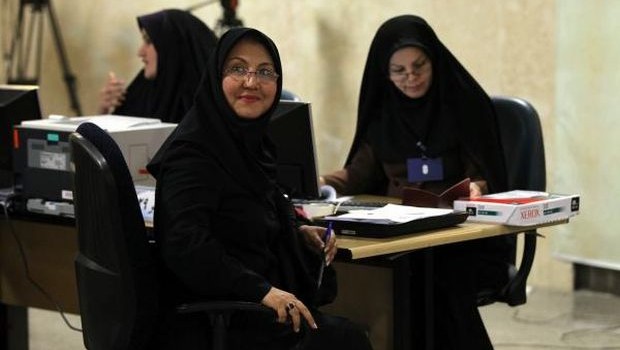
Iranian Mihan Javid smiles as she looks up while registering her candidacy for Iran’s upcoming presidential election on June 14, at the Ministry of Interior in Tehran, Iran, on May 9, 2013. (EPA/ABEDIN TAHERKENAREH)
So far, the Guardian Council, the institution charged with interpreting the constitution, has done little to clarify the definition of the key term rejal (the plural form of the Farsi word rajol) in Article 115 of the Iranian constitution, which is often translated as ‘personalities.’ The continuation of this ambiguity by the Guardian Council seems to be rooted in pragmatism.
According to Article 115, the president must be elected from the religious and political rejal, must be of Iranian origin, must be prudent and a good manager, and must have and impeccable background and be trustworthy and pious. The president must be faithful to the doctrine of the Islamic Republic and the country’s official religion, Shi’a Islam.
Azam Taleghani nominated herself to compete in the 7th presidential election in 1997, saying she wanted “to clarify the role of the rejal.” This year, 30 women have nominated themselves for the presidency, compared with 656 men.
Despite female activists’ numerous efforts and the positive political and jurisprudential opinions by some ayatollahs and ulema (Islamic scholars), the definition of rejal remains unclear. The ambiguity of this word, which seems to have been deliberately chosen by the framers of the constitution, is still the topic of discussion and debate.
Although the subjects of women and politics, women and political power and women and the presidency have always been debated in academia, from the 1997 presidential election onwards the debate over the acceptance of female candidates standing alongside male counterparts has been a concern for different media outlets, political and theological groups.
To date, Iranian officials have maintained that they have disqualified candidates because of their lack of expedience, without mentioning their gender. Ayatollah Mohammad Yazdi has recently broken with this precedent, and the reason for disqualifying women became clear.
Ayatollah Yazdi, one of the Guardian Council’s clerical members, said last week: “The law does not allow women to become president. There are ten, twelve women amongst the registered candidates and one of them has said, ‘If I become a president, half of my cabinet members will be women and the other half will be men.’ There is a well-known saying that someone once wanted to enter a village in which he was not allowed, but he kept asking, ‘Where is the chief’s house?’ The law does not allow women to become president; how come this individual has already established her cabinet?”
Abbas Ali Kadkhodaei, the spokesman for the Guardian Council, expressed a different opinion in 2009, when he responded to questions on his views on the issue of female candiates, and if women can be considered political and religious rajol.
He said: “No one is forbidden to register and enter into the game. One of the Guardian Council’s constitutional duties has specifically been to review the credentials of the candidates. In the case of political and religious rajol, there were no formal discussions and therefore there was no announcement about our decision.”
“But should we decide to address the issue, then the Guardian Council needs to interpret Article 115 of the Constitution and declare its conclusion. So far, there is no official interpretation of the issue.”
The Guardian Council will likely continue to follow the same course, and avoid a specific ruling on the issue. The Guardian Council has taken no action to prevent women registering for elections in the past, nor is there any specific ban against women.
However, Ayatollah Yazdi is not the first member of the council to have expressed an individual opinion. In previous elections, Gholam Hossein Elham, the Guardian Council’s previous spokesperson, said that the constitution’s wording specifies that the presidential candidates must be men, as well as political rajol.
During the past few years, female activists and anti-discrimination advocates have focused efforts to articulate a broad and gender-free definition of political and theological rajol as someone who is prudent and capable, so as to include women. But it ultimately is the Guardian Council’s duty to interpret the law; thus, all their efforts have so far been futile.
The comprehensive debates in the Constituent Assembly that wrote the 1979 constitution indicate that there were representatives who emphasized that the Constitution should explicitly state that only a male can become president. However, there was a minority group with a different view.
In order to resolve this conflict, the word rejal was eventually suggested and chosen, and the ambiguity surrounding the word has continued until today. It seems improbable that constitutional experts will try to clarify this ambiguity, given the outcry that would result, whichever side they come down on.
